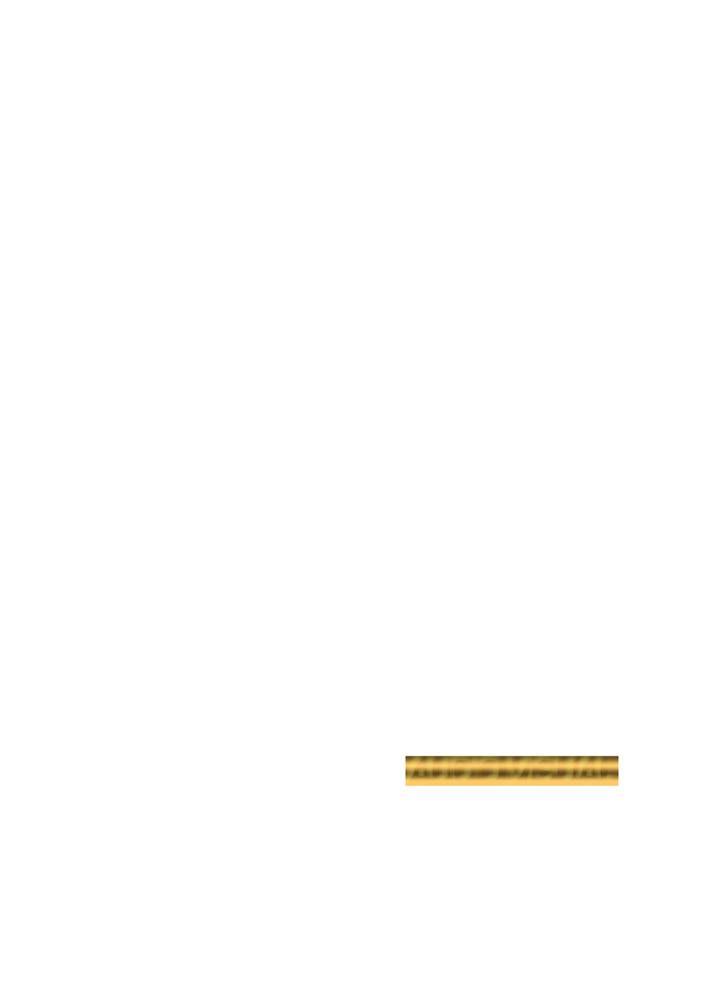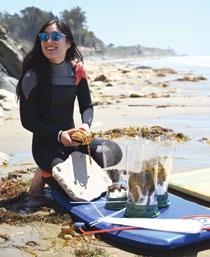
15 minute read
KLASSics inspires
We have continued to innovate throughout our history, innovating in our learning spaces and innovating in our teaching, but most importantly innovating for our students’ success.
This section of our chronicle showcases the future leaders who are paving the way for a greater tomorrow with their impact socially, economically and politically. 75 great years with the School always encouraged the innovators with each of their students. We interviewed a few alumni that are making waves in their fields.
Dr. Natasha Chapplow
KLASS 2002 - 2012
Twelve years at The Alice Smith School and now a Marine Geoscientist. She has her experience and her journey of studying physics behind the ocean.
What do you do for a living? I’m a Marine Geologist, which means I spend a lot of time conducting scientific research and then explaining my results to others. Currently, I study the Physics behind the ocean, for example waves and currents (i.e. marine), and how these processes can be related to land features such as canyons and rivers (i.e. geology). Large underwater avalanches called turbidity currents can travel from the coast to the deep ocean, and in the process sculpt underwater canyon systems - the Grand Canyon formed this way. Until recently we knew very little about underwater avalanches because they typically destroy measurement equipment placed in their pathway. The scientific research project that I am a part of has successfully captured some of the first ever measurements of these events in the oceans. Oh that’s really something isn’t it. Well done! You are making history. Not only are you making an impact in physics, you are also doing your part for the community! Tell us more about your recent volunteerism work with the Ukrainian refugees. I’ve become quite proficient in first response care from volunteering with St. Johns Ambulance alongside my PhD. Over the past 2 years I’ve actually spent more time in hospitals than anywhere else. I was fortunate enough to work with an incredible NHS team that managed to vaccinate more people than any other site in the UK. When the war broke out I had just finished my PhD a few days before. My sister had contacts in Poland that had organised our transport to key sites where there was a mass influx of refugees (train stations and refugee centres). I initially went with the intention to offer support to my sister’s work, handing out food and warm drinks to people. But while working at these sites there were many occasions where medical responders were called for. Commonly, there were either not enough, and at certain sites I was the only responder present, especially within the first 2 weeks. To summarise, I quickly began my own work at the Polish border assisting in the medical bays. I’ve worked alongside the Polish military, Polish red cross, and the Ukrainian red cross, when I began to travel directly into Ukraine to provide support in their field hospitals.
Thank you for doing all that you do! What’s the biggest factor that has helped you be successful? Hmm that depends on what type of success we’re talking about. I’ll assume that success here refers to making a meaningful impact in some way, as I believe this is most important. In my case I’d say my ability to make time to learn different skills is a large factor in my success, since I am exposed to very different situations day to day. Importantly, these situations are not always related to my career and there are many times when I have little to no relevant knowledge as my starting point – I really enjoy when this is the case. Making myself uncomfortable by purposely doing things I know very little about I believe is the way I will learn how to make a real difference, and this is how I define my own success.
All success comes with many failures along the way. What mistakes have you made along the way? All credit goes to my mentors here for expertly guiding me, such that I avoided making mistakes in the first place – the sign of any good mentor! So that means the other side to this question is how have I avoided making mistakes along the way? I’ve sought to work with people whom I could trust would not let their own agendas compromise my own career path. I think sometimes people forget that choosing a mentor is a decision for both parties (mentor and mentee) to make. I was prepared to turn down a PhD offer if I didn’t feel that there was a strong mutual trust between my mentors and myself.
What was the hardest decision you ever had to make? The one I am about to make next since I’m currently looking for a new job. I’m looking to transition from academia into industry. But selling how I can bring value outside of my own field is difficult, despite that I’m able to handle a wide range of scientific information from multiple different fields within Earth Sciences. Hiring managers do not always want to take the time to understand how multidisciplinary knowledge can bring value, therefore they tend to go with candidates that present more clearly as a box that they can then tick. Who can blame them when it’s easier to hire someone that knows or has previously done exactly what they are looking for. But I argue that businesses cannot expect to deliver truly innovative solutions if they are unwilling to hire people who have high levels of knowledge in other disciplines, and also the skills required to make their knowledge relevant to the needs of a particular business. I believe that there are companies who also share this sentiment, and that I’ll be able to demonstrate my value when the right opportunity arises. Otherwise, I’m sure there will be some even harder decisions on the way!
What is the best advice you can give about putting yourself out in the world? Don’t be afraid to speak clearly and simply in business, and in life! In my experience there is fear around using simpler words to explain an idea or concept, because using acronyms, long words, and complex terminology is often falsely associated with intelligence and competence. Additionally, there are those that believe, if a listener does not understand the speaker this reflects a lack of intelligence, when in fact I have found the opposite to be true. Particularly in science, the ability to bring everyone in the room along with you as you explain a new and seemingly abstract discovery is a true demonstration of intelligence. I held the post of Head of Digital Transformation at MediaCom and was the Global Ecommerce lead for LVMH Group. Working at the nexus of media, commerce, and retail innovation and in partnership with some of the world’s leading tech companies like Meta, eBay, and TikTok to build customer-first commerce solutions for brands from LVMH to Colgate.
We heard that you also did some volunteer work with the Ukrainian refugees. Tell us more. I was working with about a few hundred refugee children in London to make sure they have the necessary equipment to get into school and help them with reading English and also just to help them be children.

Jessica Chapplow
KLASS 2002 - 2012
Jessica Chapplow is the twin sister to Natasha. She’s another force to be reckoned with! She too is in a challenging and demanding field that requires innovation and transformation. She gives her all not only to her work but also to the communities in need.
What do you do for a living? I specialise in ecommerce and digital innovation, focusing on the role of cutting-edge technologies, ranging from artificial intelligence, blockchain to augmented reality, and their impact on the CX. In my current role as Partner & Head of Ecommerce at Havas Media Group, I am responsible for leading, managing, growing and evolving all aspects of Havas Market’s UK offering, to develop commerce media strategies that effectively drive meaningful outcomes. Previously, to Ukrainian refugees in Poland has been the most challenging time for me personally and professionally.
What’s the biggest factor that has helped you be successful? Knowing the difference between doing what you’re told to do and doing what you’re capable of. I think that stems from two different things, courage and curiosity, so I think those are two traits that I used the most. The catalyst that drives the most authentic kind of success. Loving what I do but having the courage to not to be confined by job descriptions, titles, even industry is what success really looks like to me.
Success isn’t just about some of your accolades, it’s really about some of the actions you take and make for others and I think and that’s a bit easy to forget about success and what that means as well when you are chasing for that next promotion or awards.
I helped in the days and weeks that I have been travelling back and forth between London, Krakow, Warsaw, and the crisis hotspots near the Poland/ Ukraine border. I have met countless people, and while some interactions are more fleeting than others, each encounter leaves an equally lasting impact.
I hope my greatest achievement is still yet to be accomplished. However my most significant achievement so far, due to the physical and mental toll it has (and is currently taking), is my humanitarian work to help fundraise and deliver medical supplies, as well as transport Ukrainian refugees from the Polish border, while simultaneously holding down my 9-5 job at Havas. Closing my laptop at the end of a working day and throwing on my high-vis jacket to head out to distribute emergency supplies has been gruelling but worthwhile.
My sights are firmly set on going even further against the grain. Juggling my full-time work with helping fundraise, collect and distribute emergency aid With success there are always some misguided paths. What are some of the hardest decisions you ever had to make? I probably say it is trying to juggle work, full time work and my own business in the ethical intelligence platform. The responsibility in making sure that I have to give 110% to those different areas at any given time or even at same time is constantly a juggling act. The decision it comes down to usually requires the ability to really prioritise without dropping a ball on anything.
What is the best advice you can give? I think probably curiosity is the currency of competence and really what I mean is a lot of the time I think we are over focusing on, especially at work and also sometimes outside of it you know being the smartest person in the room. For me it’s about being the most curious. You are never too young or old to relearn again and that’s what makes some of the most brilliant people out there just because they focus less on having the right answers all the time and actually more on what it means to ask the right questions. I think that’s the basis of a lot of great thinkers and a lot of great people probably who lead with curiosity and an interest over ego and I think it is really important.
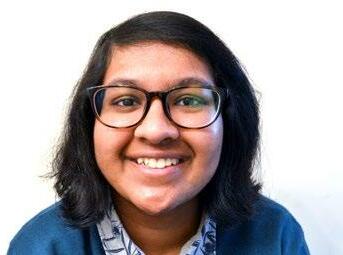
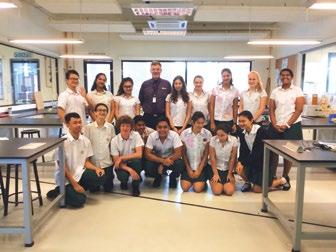
Antara Sen
KLASS of 2015 - 2019
A rising star who is making a name in the physics community.
What motivated you to go into Applied Physics? I graduated summa cum laude from Ithaca College with Honors in Physics and Mathematics. I am currently pursuing an Applied Physics Ph.D. programme at Northwestern University in Evanston, IL.
Although I had always loved Physics, I realised that I wanted to pursue it past school when I had Mr. Spittal as my Physics teacher at Alice Smith. He really changed how I saw the subject and my own ability. But so did my Media Studies teachers, Mr. Lynn and Mr. Doyle. It was because of them that I decided to double-major in Physics and Cinema at Ithaca College, but I soon realised that Physics was my real calling. So, I dropped Cinema and picked Maths as my second major. Doing research with my professors here, I realised that I wanted to build on fundamental physics by applying it to new fields. My current area of interest is soft matter/ biophysics.
We heard that you were working on the NASA OSIRIS-REx mission, designing the world’s largest superconducting quantum levitation track. How amazing! Tell us more. We finished building a prototype for the superconducting track last summer, and the full track will be on display at the World Science Festival’s exhibition in NYC in June. My work with the OSIRISREx project is wrapping up as well. For my Maths thesis, I am writing a machine learning algorithm to analyse a specific feature of asteroid Bennu’s spectrum. What’s the biggest factor that has helped you persevere and be successful in all that you do? It’s cliché but passion is what has kept me going. The pandemic was hard for morale and my determination waned at times, but being in a physics classroom feels like home to me. Honestly, there is nothing I would rather be doing. And it was this quasi-obsession which helped me stay focused and got me here.
Successes stem from many missteps. What mistakes have you made along the way? I have made so many mistakes, but the one thing I’ve learned is that the consequences of your mistakes aren’t permanent when surrounded by people who love and support you. My professors at Ithaca College have helped me get back on track when I’ve needed it, and I am grateful for all their guidance along the way. What was the hardest decision you ever had to make after school? Choosing between colleges three years ago was a tough choice. Financial reasons forced me to pick Ithaca College. I was resentful at first because I was going to this obscure liberal arts college, but it soon became the best decision I ever made. This place changed my life. The same cycle repeated itself when I had to choose a graduate program to enrol in, but I can only hope that it turns out to be as good a decision as picking Ithaca College.
What advice can you share with us about believing in themselves? Do what feels best to you. In critical moments, no one knows you better than yourself, so yes, ask for advice, but how you act on that advice should be up to you and you alone.
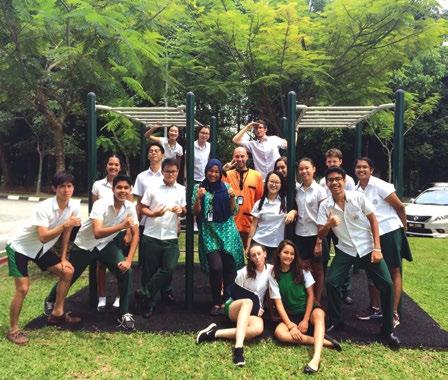


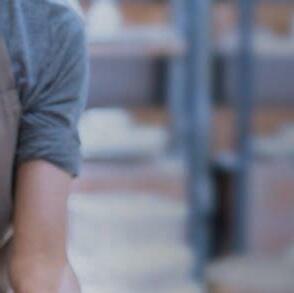



HEALTH & SECURITY
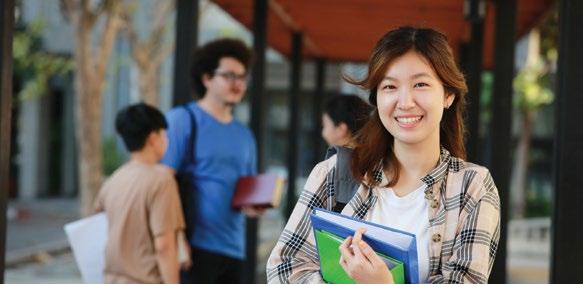
SOLUTIONS FOR EDUCATION
Global events are catalyst for change. For example, September 11 fundamentally changed the way institutions considered the security of students, faculty and staff. It’ s evident COVID-19 has brought about similar changes regarding considerations for health and wellbeing, on and off campus.
We have found through supporting our clients that a comprehensive campus resilience program should focus on protection and support, providing an equality of access for all, from employees to students and faculty, campus staff, international students and assignees. Our actionable insights and unparalleled services uniquely enable us to more fully support your organization as you prepare to return to campus, resume and scale up activities and academic programs, and return to domestic and international travel.
WHY CALL US?EH L TH & MEDICAL SAFETY & SECU R I TY PERSONAL WELLBEING
ILLNESS & EPIDEMICS/ ROAD SAFETY ENVIRONMENT
Toothache Vector Borne Directions Natural Di sast ers
Me dica l Referrals Infectious Diseases Taxi Advice Political Instabil i t y
Brea ks / Sprains Influenza Vehicle Accidents Civil Unrest
F lu / Fever / Diarrhea Rabies Threat Road Rules Terrori sm
A i r Q ualit y Family Issues Extreme Solitude Airport Closures Hote l Re fe r
r a l
W a t er P ot abilit y Cultural Concerns Feeling Isolated Immigration & Visas
Situa t ion U p d a t e Q ual i t y of C are Women Travelers Language Barriers Lost Travel Documents Secure Transp o r t a t i o n
L a c k of Cl eanli ness LGBTQ Travelers Psychologist Referral
Detention by Police
Pre Trave l Br ie f i n
C O N A INJURY PANDEMICS & ADVICE /THREATS g
DI TIONS ADVICE PSYCHOLOGICAL SITUATIONS SECU R I T
L OCAL GENERAL DEPRESSION/ STRESSFUL TRAV E L Y
CALL OUR 24/7 SCHOLASTIC DEDICATED LINE OR ANY OF OUR 26 ASSISTANCE CENTERS
For more info on how we can help enhance the resilience of your campus email us at marketing.msia@internationalsos.com






